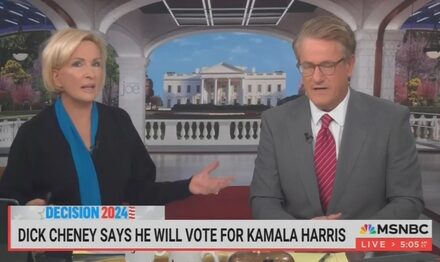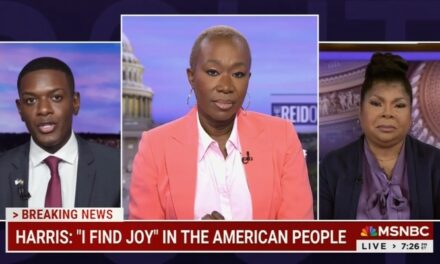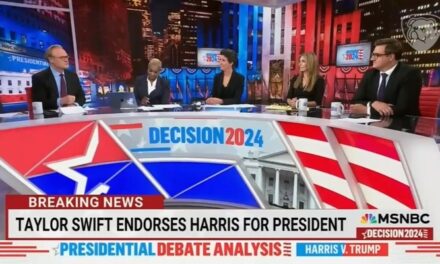We support our Publishers and Content Creators. You can view this story on their website by CLICKING HERE.
It’s been 35 days since Joe Biden quit the race and turned the keys of the campaign over to Kamala Harris. She has failed to conduct a single sit-down interview since then. It doesn’t count to accept “how are you feeling” questions as you walk by.
Today’s edition of CNN This Morning devoted a segment to a discussion of Harris’s interview strategy. But there was no urgency or outrage to it. CNN host Kasie Hunt merely wondered out loud, “Are they thinking they might be able to survive for weeks without it?” They’ve already gone weeks without it.
CNN analyst and Axios.com reporter Alex Thompson laid out that Harris’s “extraordinary caution when it comes to interviews is why some Democrats were nervous about making her the nominee. It’s why people like Nancy Pelosi and Chuck Schumer were more in favor of like an open process, because the fact is that every, almost all of her worst moments as Vice President have come in live interviews.”
Hays turned to former Biden communications aide Meghan Hays and threw another who-cares softball about denying the media interviews: “You’ve advised candidates on how to handle all of this, how to deal with interviews, what, when the need to do them, when you don’t. And you have said, you often argue that they don’t need to do them. Where do you come down on whether this is something Harris needs to do and why?”
Hays said with all the media momentum and campaign cash, “Maybe they do go for a morning show, a softer interview at first.” (Is CNN This Morning softer than Morning Joe?) And then, “she should probably start doing local media interviews as well…”
Former Tim Scott campaign adviser Matt Gorman jumped in: “Because you can intimidate them. Obama would bring them into the White House and intimidate them.” Hays was horrified, but Thompson agreed: the Biden White House did this just a month ago. Right after the debate, the first two interviews were the black radio stations. And they basically bullied them.”
After a hubbub broke out, Hunt said out loud “I don’t want to talk about that.”
At NewsBusters, we might ask: how do the national news media not look bullied? They have accepted this no-engagement rule without any real outrage. It’s just a bucket of whatevers.
For example, this entire segment left the subject of Kamala’s avoidance out of the screen graphics. The whole time, it only said “Harris & Walz to Campaign in Georgia This Week.” (If you’re watching without sound, why turn it up?)
Kamala’s campaign can rest assured that, with just the smallest smattering of challenging questions, most of the queries will be softballs along the lines, “Madame Vice President, what kind of threats to democracy and a woman’s right to choose would a Trump presidency present?”
But Harris aides may fear her answers more than the questions. Witness her train wreck interview with Lester Holt, when, pressed as to why she hadn’t been to the border, she retorted that she hadn’t been to Europe either, and didn’t understand the point he was making.
Here’s the transcript.
CNN This Morning
8/26/24
6:05 am EDTALEX THOMPSON: Some Democrats were surprised that Kamala Harris did not do the traditional barnstorming right after the convention. Usually, you finish up the convention, you do a ton of rallies. She took the weekend off, and I think some Democrats were a bit surprised that, why not keep your, keep your foot on the gas?
KASIE HUNT: Yeah. Alex, what is your kind of, your latest reporting digging into the Harris and Biden, I mean, we’ve seen Biden is taking another week of vacation. The Harris team is going to, there’s been these kind of rumors floating around that they’re sort of setting up to do a major interview.
Are they going to do that? Like, are we going to see her out there in that way? Are they thinking they might be able to survive for weeks without it?
THOMPSON I mean, they’re definitely going to do an interview. Now, the question is, who is it with? Is it what a much more friendly host? Is it with a more serious, like a serious in-depth interview? How long is it? Is it edited? Is it live?
Like, all of these questions are, are what, you know, part of Harris’s caution—extraordinary caution when it comes to interviews—is why some Democrats were nervous about making her the nominee. It’s why people like Nancy Pelosi and Chuck Schumer were more in favor of like an open process, because the fact is that every, almost all of her worst moments as Vice President have come in live interviews.
MATT GORMAN: She needs to do an interview. I get it, in a political operative in me I understand why she’s hesitant. However, the other side of this is that I’ve, look. I’ve seen this with candidates after candidate, debate prep is also media prep. Media prep is debate prep. You hear the lines, you can refine your arguments, you get better. Every candidate I’ve ever ever worked with gets better the more they do interviews, because they get sharper and they know what really, outside of the bubble, what the people are going to attack them on or question them on.
MEGHAN HAYS: Is it the the comfort level? You get more comfortable about policies —
GORMAN: Yes.
HAYS: — You get more comfortable speaking and having those rapid-fire questions? So, where I’m always, don’t think she needs to take, do sit-down for major interviews. she needs to start. And to your point, doing those types of things for debate prep.
. . .
HUNT: Meghan, I know you are, you’ve advised candidates on how to handle all of this, how to deal with interviews, what, when the need to do them, when you don’t. And you have said, you often argue that they don’t need to do them.
Where do you come down on whether this is something Harris needs to do and why? Like, what are the pressures on her? So, I think it’s a media story, right? And I think that if you don’t take control of it, it will just continue to snowball in the media. And then it becomes more of a high-stakes thing than if you just did the interview.
MEGHAN HAYS: So where now, she’s past the convention. She has the momentum. They’ve raised a ton of money. I think she should probably sit down for an interview. To your point, it depends who. They should be really strategic in that. Maybe they do go for a morning show, a softer interview at first, and then they build, keep building.
. . .
HUNT: Alex, there’s also this argument that if you do a lot of interviews, then any one potential mistake becomes less of a big deal.
THOMPSON: Yeah. I mean, that’s certainly J.D. Vance’s strategy. You’re seeing him really sit down for tons of interviews. And, like, the questions have been tough, right?
And the thing is, that as she has waited, that’s it’s been July 21st was when Joe Biden came out. It’s been well over a month. The fact is, we’re now talking about, it is now a story. The stakes of this first media interview are much bigger. Any one mistake she’s gonna make is going to be, like, immediately seized upon by Trump and his campaign.
HUNT: Yeah. Well, and some of the J.D Vance strategy also seems to be setting up a contrast, so that he can actually say, oh hey, look, I did all these interviews.
. . .
HAYS: Like we did in ’20, we did a local media strategy, and she should probably start doing local media interviews as well as big national —
GORMAN: Because you can intimidate them. Obama would bring them into the White House and intimidate them. That is true!
HAYS: That is not, that is not what I was talking about!
GORMAN: I know, I know.
THOMPSON: I mean, the Biden White House did this just a month ago. Right after the debate, the first two interviews were the black radio stations. And they basically bullied them.
[Inaudible cross-talk]
HUNT: I don’t want to talk about that.
HAYS: It’s very effective, because you sit down with the three networks, the three major stations, in each market that you go to. And it drives the story in the markets that you’re trying to [inaubible.]
HUNT: I know. I mean, local interviews are very different.
GORMAN: Very different.

 Conservative
Conservative  Search
Search Trending
Trending Current News
Current News 





